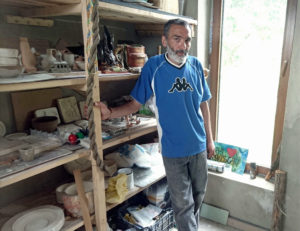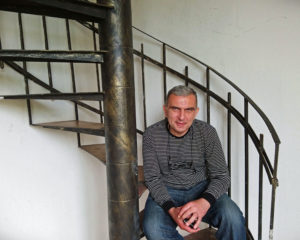
Author: Irma Kakhurashvili, Georgia
Gocha and Nikoloz are clients of ‘Bridging the Gaps: Health and Rights for Key Populations’ project in Georgia.
Art therapy works
Gocha lives in the hottest region of Georgia – Kakheti – in a small town of Telavi. He is a client of a Rehabilitation Centre in Gremi village. There he receives support to overcome his alcohol and substance use problems.
The Rehabilitation Centre for drug users run by Tanadgoma is the first and only stationary rehabilitation centre in the country offering free services to its clients. Since it was founded, over 25 clients received help free of charge there. In the Centre, clients can get social, psychological and health services. The Centre applies twelve-step recovery programme. Besides, it offers art therapy classes and even runs a ceramic workshop. The instructors working in the Centre were trained in a Ukraine-based rehab.
As many of his friends, Gocha used to smoke “harmless weed” since he was a schoolboy. Soon enough, he found himself among people who were eager to use other drugs as well. At first, he was curious to experiment with substances, but during the heroin boom in Georgia – when it could be purchased even in the Kakheti villages – the situation changed. If Gocha was lacking money to buy drugs, he had enough to get some alcohol. Gocha’s family knew about his problems. His parents told him that he would find himself in a trouble, but it did not help. After the government introduced stricter rules for drug dealers and users, Gocha switched to the homemade drugs.
He first came to the Tanadgoma Rehabilitation Centre two years ago. Gocha took part in the twelve-step recovery programme, attended counselling sessions and art therapy classes. Currently, the man is in remission, but sometimes he comes back to the Centre seeking services. He says that sometimes he drinks alcohol. Georgia is the motherland of wine, so it is hard to quit alcohol.
“I do not know what would happen to me if not for this project. Now working with clay and ceramics is the biggest joy for me. There is a radio set in the workshop and I can work all night long, listening to music. I have a lot of creative insights and the process of work is very important for me. When I draw sketches, I think of nothing else. My negative thoughts go away,” he tells.
Gocha does not know if he will be able to quit drugs and alcohol for good. There are no guarantees, but at least now he understands how to reduce the harm he does to his health. Gocha finds his support in knowing that if he goes home and has a relapse again, he can always come back to the Centre or contact harm reduction programmes.
Sometimes small tours are organized for the clients of the Centre. This region of Georgia is famous for its historical sights and beautiful nature.
“Sounds of the river calm me down. There I can think about my life. I spent 11 years behind the bars and I have many regrets… Now there are a lot of pharmacy drugs in Georgia, many people need psychosocial support… I do not understand why the government does not want to implement rehabilitation and employment programmes instead of the repressive drug policies. It does not want to be responsible for such people as me. So far, the Centre is the only place where someone cares about my mental health,” says Gocha.
He has two dreams: to equip the Rehabilitation Centre with exercise equipment for its clients to stay fit so that they are able to start a family.
“I want my empty house in Telavi to be full of child laughter and hope. I want to live a normal life,” says Gocha.
Drug use changed my life

Nikoloz is 45 years old. He is a former police officer. His professional career ended up when he was arrested for drug use and sentenced to seven years of imprisonment. Before that day, he had no problems.
“I was 18 when my friend and I tried drugs for the first time. Little by little, I got used to drugs. My brother also did drugs, but I was afraid to tell him. I felt uncomfortable to talk about it with my family. Then I studied law, started working in police and that is when I got really “hooked.” I had powerful relatives, so I felt safe, but after eight years of active drug use I was locked up,” remembers Nikoloz.
Seven years in prison were a dreadful, lost period of his life. Then it was easy to get drugs in closed settings and Nikoloz used this opportunity. However, one case of severe overdose, when he almost died, made him rethink this situation. After he got back home, all his social connections were lost.
“Then I thought that it was enough, I had to stop. Even now, I hate drugs with all my heart. I fight them and fight myself. Last year I had a relapse. Therefore, I had to enrol into a substitution therapy programme and receive treatment in a clinic,” confesses Nikoloz.
He feels sorry because drugs changed his life but says that if years ago he had access to harm reduction programmes, he would definitely enrol in them. Back then, he knew little about reducing the risks of drug use.
“I had no strength or desire to quit drugs, but I would surely use them in a safer way, for example decreasing the frequency of injections. I would be able to control my life and health and would avoid overdose and hepatitis C. Drugs will always be there. Non-medical use of drugs is bad for everybody – the individual and the society – so protection of public health requires protection of drug users’ health. For that purpose, drug users should be integrated into the society and not isolated,” says Nikoloz.
In jail, Nikoloz got acquainted with people working for Tanadgoma, who offered different services to the inmates, in particular, psychological support, which was very important for him.
After Nikoloz was released, he went to a social bureau in Tbilisi. Tea Chakhrakia, working for Tanadgoma, helped him to re-issue his documents. Besides, people from Tanadgoma helped him to get a job with Akhali Gza NGO providing harm reduction services to people who use drugs. Since then, Nikoloz has been working as a social worker there. For him, his job is not only his responsibility, but also his real family, where he is loved and respected, and such love and respect are mutual.
Nikoloz is convinced that harm reduction services are more effective than incarceration. The best approach to resolve drug-related problems is to work with people who use drugs and not punish them.
“In our country, drug policy is based on some Utopian ideas because the government thinks that the drug use may be eradicated. In Georgia, criminal justice is the only method to solve the problems of injecting drug use. Drug use is treated as a criminal offence, though there is a strong evidence proving that repressive drug policies are ineffective and prevent access of people who use drugs to health services,” says Nikoloz.
Nikoloz is happy to share his experience with junior outreach workers. He works with clients, motivating them to get tested, helps them to prepare all the required documents, develops support plans, and tells people about safer drug use methods.
“I am really grateful to the project for the job that I have, which helps me feel that people need me. I received help one day, and now I can help others, sharing my experience with them. My clients are people who use drugs. Many of them use drugs only to overcome their withdrawal syndrome. They are the ones who really need support. I want them to understand what is waiting for them ahead,” he says.
Nikoloz says that with support of harm reduction experts many good things may be done for people who have already lost any hope. That is why it is important to implement the projects, which meet the specific needs of vulnerable populations.
“I am glad that in prison I met people who saw my potential and believed in me,” he says.
About the project
‘Bridging the Gaps: Health and Rights for Key Populations‘ is an international project implemented in 16 countries of the world to improve the health and protect the rights of vulnerable populations. In Georgia, the project was launched in September 2012. Its main goal is protecting human rights of drug users by changing social attitudes and government policies and improving the quality of services delivered and access to them.
In Georgia, the project is implemented by Bemoni Public Union and Tanadgoma Centre for Information and Counselling on Reproductive Health. Bemoni provides services in the social bureau based in Telavi (Kakheti), and Tanadgoma – in the social bureau based in Tbilisi. Besides, in 2015 Tanadgoma opened a Rehabilitation Centre for people who use drugs in the Gremi village, Kakheti.
In 2012-2017, over four thousand people who use drugs received 17,321 medical, psychological, social and legal services within the project.



